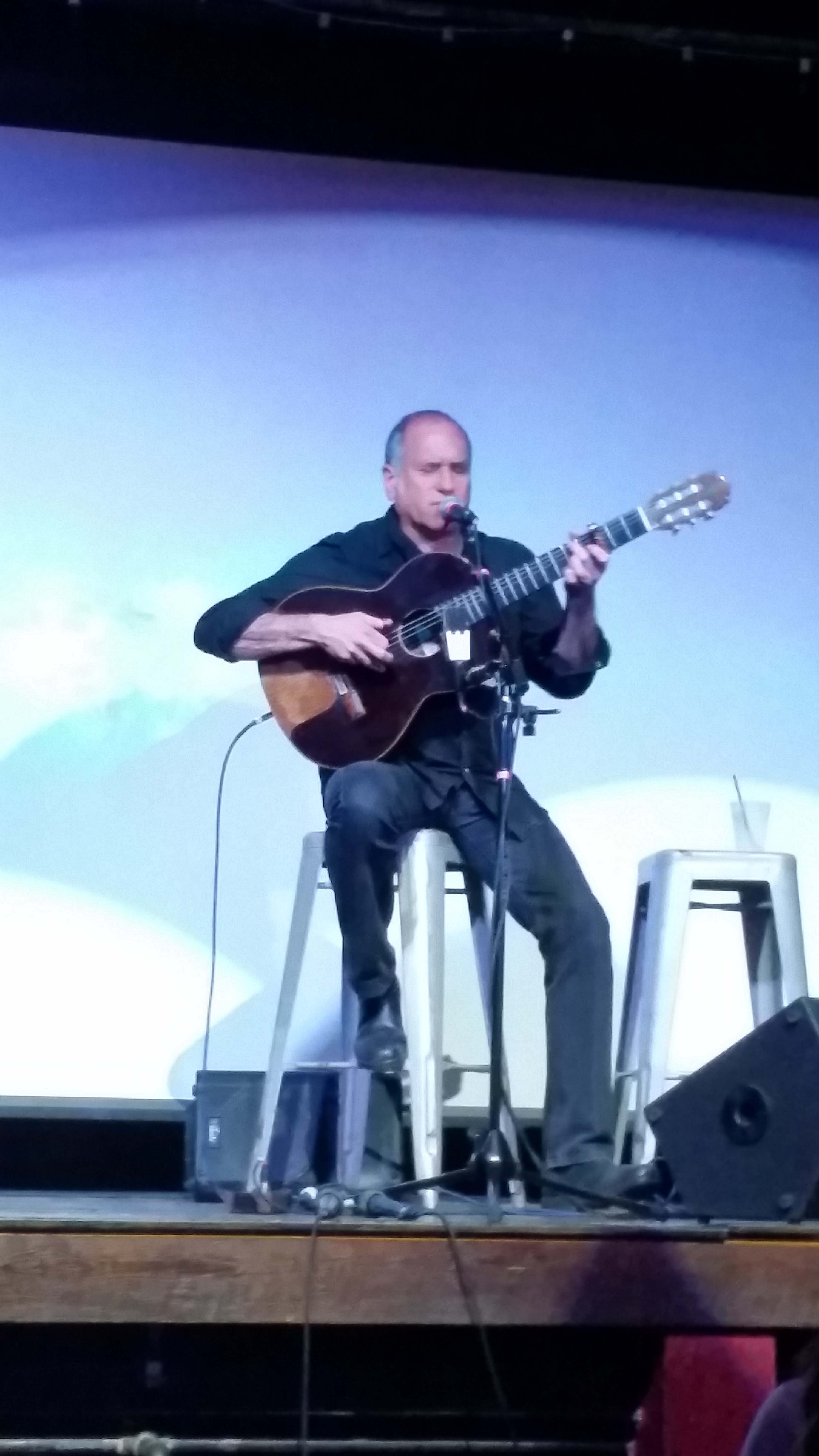A two-year old initiative called “Open Hillel” is once again in the news. For those of you who aren’t particularly interested in Jewish politics, much less the emotional stirrings of Jewish students on college campuses, this probably feels like “much ado about not much.” But it is important to me, and I hope you’ll indulge me for a bit.
When I arrived as a young college student at the University of Wisconsin in 1969, the campus was in almost constant tumult with events related to the Vietnam War. Madison (Wisconsin), UC-Berkeley and the U of Michigan (all campuses where I had or would have strong connections) were among the most active, but the uproar was everywhere. There were even students shot and killed–which left an enduring legacy in the form of the Crosby, Stills and Nash song “Four Dead in Ohio.”

Berkeley’s Hillel House as it looks today.
At Berkeley, Jewish students opposed to the war formed a collective they named “The Elders of Zion” and published a campus newspaper called “The Jewish Radical.” The newspaper and the group received support and a home in the local Hillel Foundation. At Wisconsin, Jewish students created an ambulance brigade to provide first aid to demonstrators (or anyone else) who was injured in the demonstrations. That operation, likewise, was housed in the local Hillel Foundation.
Lest you think this was all the exaggerated antics of over-enthusiastic youth, let me provide a very personal anecdote. In the late Fall semester of my second year at Wisconsin, I left a mid-term exam in Geology, got on my bicycle and started pedaling towards my next class. When I turned the corner of State and University Avenues, an unmarked police car pulled up beside me. I glanced at it just long enough to see someone pointing a grenade launcher at me. The grenade hit me in the leg and detonated a tear gas canister. I skidded to the side of the street enveloped by the gas. Suddenly a middle-aged, matronly woman bolted out of the closest building (Chadbourne Hall). She grabbed me under my arms and hauled me into the building where someone else dumped a bucket of water over me.
First aid was important in those days. And no, I had no idea what was going on (it turned out that a band of demonstrators had passed that spot a few minutes before I turned the corner), and I had absolutely nothing to do with whatever the officers were reacting to. Not that I was innocent of participation—I did attend demonstrations. Just not that day.

Neither this lovely facade nor the photo of Berkeley’s Hillel resemble the buildings of my era. As nice a statement as these facades may make, no one should be surprised that it took major fundraising to transform the old edifices.
At Madison the rabbi of the Hillel allowed the facility to be used for the makeshift first-aid center. At Berkeley, the rabbi supported the student efforts to create a journal for vigorous debate of the issues of the day—particularly the issues that stirred the minds of young, Jewish students. And similar activities were supported throughout the country wherever there were enough Jewish students who desired to use the Hillel Foundation as a home base for their discussions and activities.
A decade or so after the Vietnam War had ended, Berkeley’s students were involved in another cause. Refugees were arriving from Central America. Many campus religious organizations offered these refugees a place to stay and eat. No one at these churches was particularly concerned about the legal status of these obviously beleaguered people. Berkeley’s Hillel Foundation was not directly involved in most of this activity, but there were occasions when there was overflow (too many guests) or a church needed its full facility for an event–and on such occasions the Jewish students would take the refugees over to Hillel for that time.
This was the Hillel of my college and early professional years. Sensitive to the issues that motivated Jewish college students and willing to take small risks (there were never any serious consequences to any of these activities) to assure those students that compassion is an important component of the Jewish faith.
Today, these sorts of things seem to be a thing of the past. Hillel Foundations avoid even the slightest controversies like the plague. Hillel directors shun any sort of activities that cannot be directly connected to matters of interest to Judaism, and even in that smaller arena, the official Hillels are places where any sort of criticism of Israel cannot be countenanced.
What happened? As an historian I like to say, “Whenever anyone says it’s not about the money, it’s always about the money.”
The Hillel Foundations have an interesting history. They were not created by a religious community but rather a fraternal organization called B’nai B’rith (the Jewish version of organizations like the Shriners and Masons). B’nai B’rith was also the home of an international youth association and most-famously the Anti-Defamation League. B’nai B’rith’s status as a fraternal rather than religious organization allowed their affiliated agencies to be non-denominational: all Jewish students should feel equally at home no matter whether their background was Reform, Conservative or Orthodox, or for that matter secular. In order to foster the widest degree of participation, most Hillels tried to serve kosher food and adhere to standards of Sabbath observance that would satisfy all but the most Orthodox of students. Essentially it was a matter of serving the students who would come.
The central office for the Hillel Foundations didn’t have much time to deal with local issues and most local directors (some but not all of whom were rabbis) were given wide discretion. Most of the Foundations were given funds to cover the directors’ salaries and a bit for programming, and needed to raise the rest locally. Oddly enough, this arrangement gave the local foundations a bit of cover which freed them from too much concern about petty local politicking in much the same way that Roman Catholic congregations are sometimes shielded from local politics by the central control of the Vatican.
All this came to a rapid demise in the late ‘80s. Fraternal organizations in general, and B’nai B’rith more than most, saw huge declines in membership and fundraising. Those Hillel Foundations which had received significant funding from the national office were told to make friends locally. That meant dealing with the sources of local Jewish communal funding which generally go by names such as the “Jewish Community Federation of…” Eventually, the situation deteriorated to the point that B’nai B’rith and the Hillel Foundations found it necessary to separate into completely independent organizations. Today, B’nai B’rith has nothing to do with the hundreds of campus Jewish organizations it founded.
One of the casualties of this process was intellectual freedom within the Hillel populations. That may seem like an extreme statement, but bear with me and I think you will understand that it is no exaggeration.
Jewish Federations are not democracies. They were designed to raise the maximum amount of money possible, and to do that they learned to cater to the biggest donors. In most communities those donors are rich, politically conservative, and often vigorously pro-Israel. Of greater importance, they often feel strongly that they do not want their contributions funding any activity that might be perceived as “bad for Israel.” And as the Israeli government has become increasingly conservative in recent years, American Jewish federations have moved along that path as well.
To illustrate how this can affect the academic environment, consider the case of Daniel Boyarin. Boyarin is among the most important scholars of early Jewish religion and history. He holds the Taubman Chair of Talmudic Culture within the Near East Studies department at UC Berkeley. His scholarship is unquestionably of the highest caliber, and he has important things to say about the history and evolution of Judaism in its critical and formative period. Despite his stature in scholarship, he is persona non grata in most Hillel Foundations and Jewish communal institutions such as adult educational forums sponsored by those communal institutions. Why? Boyarin has been an outspoken personality on the progressive or if you will left-wing side of Israeli/Zionist politics, and that irks many of the big donors.
In response to these donors, Hillel has posted guidelines which at first glance might seem innocuous, but contain clauses that can be used to exclude scholars such as Boyarin as well as prominent rabbis and other Jews who are unwilling to commit to what ultimately comes to a matter of restraining free and unfettered speech. The guidelines can be found here:
http://www.hillel.org/jewish/hillel-israel/hillel-israel-guidelines
Without turning this into a lengthy study of these “guidelines” let me say that I think most would agree that the single most difficult part of these guidelines is the bullet point which excludes anyone who supports: “… boycott of, divestment from, or sanctions against the State of Israel.”

This is more like the scenes that I recall…
Personally, after careful consideration, I cannot support what has become known as the “BDS” approach. But I find it completely unacceptable that Jewish students should be prevented from learning why other Jews believe this is the correct approach.
Boyarin’s academic methods and conclusions are not universally accepted in the community of Jewish scholars, but none would deny that his claims are credibly based on profound analyses of the sources available to us. To exclude a scholar such as Boyarin is to make a mockery of the idea of scholarship and to deprive Jewish students of one of the most creative minds available to them. But that is exactly what has happened in Hillel Foundations around the country. And this is directly a consequence of the conversion of institutions such as Hillel Foundations into creatures of the local Jewish communal organizations.
I have used Boyarin as one example of this issue, but he is hardly unique. As those of you who have read him might expect, Noam Chomsky, one of the world’s most renowned public intellectuals would not pass muster under these guidelines. My dear friend Rabbi Jeremy Milgrom, a tireless warrior for peace and the scion of one of the most prominent rabbinic families in the world would likewise be excluded from Jewish audiences if the national Hillel organization had its way.
What is lost in this haze of politics is that students suffer (and this is true whether we are speaking of Jewish students or any other such groups) when they are denied the ability to hear the wide range of opinions that is a significant feature of higher education. Imagine denying Arab students the right to hear an Arab scholar speak about the positive relations between Arabs and Jews in the Middle Ages because some sponsoring Arab communal organization is concerned about looking too pro-Jewish.
And so we come to the “Open Hillel” movement that seems to be gaining traction at many universities these days. As the term suggests, Jewish students on several campuses have declared an interest in hearing from all sides in the fractious environment of the Middle East. They are not willing to exclude voices such as Boyarin’s. And perhaps even more serious from the perspective of the organized Jewish community, they are willing to listen to speakers and organizations which represent pro-Palestinian and even anti-Zionist schools of thought.
There is not the slightest doubt in my mind that if I were a college student today, I would be part of the Open Hillel movement. I strongly suspect that if things were then, when I began my career with Hillel Foundation at Berkeley, as they are now that I would not have been considered an acceptable role model and probably would not have been hired.
The irony in that is that I am neither anti-Israel nor anti-Zionist. While I do have serious reservations about the policies of the current government of Israel, I continue to believe that Israel serves an important purpose in providing refuge for Jews who become the subject of persecution. In a world in which many countries provide special status to their ancestral peoples, I do not see any reason why Israel cannot do so for Jews. But because I am unwilling to declare loyalty for the Israeli policies which I happen to oppose, I would not be considered an appropriate hire for most Jewish communal organizations including most Hillel Foundations.
All of this would be the sad ruminations of an aging curmudgeon if it weren’t for one fact I mentioned above. I believe strongly that the policies I have mentioned here are damaging the ability of Jewish communal organizations to reach college-age Jews. We should all be celebrating the “Open Hillel” movement because it, far more than the regular Hillel Foundations, has a chance of reaching that critically important population sector and perhaps retaining some of these motivated, highly educated Jews for the future of the community.

 ommunicate with a friend on something other than what might be considered appropriate business matters? Chances are, and especially if we are savvy about business and privacy issues, that we will use a different email system than we use for work purposes. We might use Gmail, AOL, Yahoo, Hotmail or any of a large number of other services. Any of these would be “private” in the sense that they separated from our “public” (work) persona.
ommunicate with a friend on something other than what might be considered appropriate business matters? Chances are, and especially if we are savvy about business and privacy issues, that we will use a different email system than we use for work purposes. We might use Gmail, AOL, Yahoo, Hotmail or any of a large number of other services. Any of these would be “private” in the sense that they separated from our “public” (work) persona.





 in 1990.
in 1990.